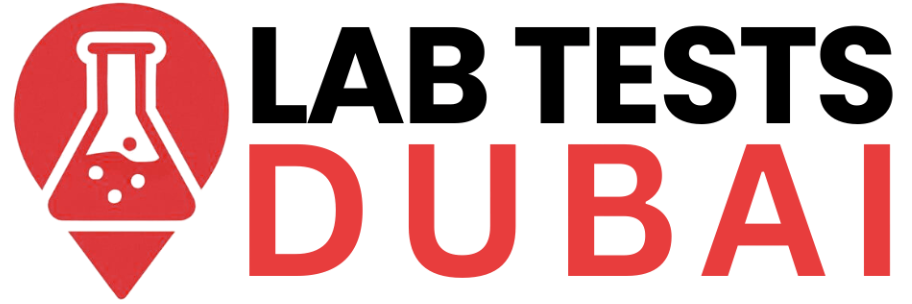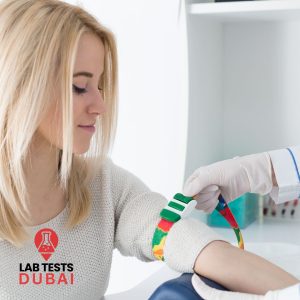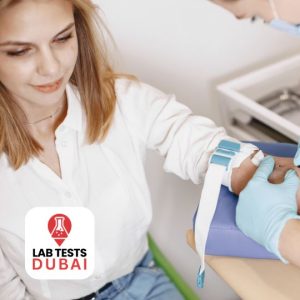
Down Syndrome Risk Screening 1st Trimester Prenatal Test
599,00 د.إ
Down Risk 1st Trimester Screening offers unparalleled value by combining accuracy, safety, and early insight into your baby’s development. It empowers parents with critical information at a pivotal time, fostering confidence and informed decision-making throughout the pregnancy.
| Down’s Risk : 1st Trimester |
| Parameters |
| Free B-Hcg |
| PAPP-A |
| 11 TO 13 Weeks + 6 days |
Description
Down Syndrome Risk Screening – 1st Trimester Screening
The Down Syndrome 1st Trimester Screening from Lab Tests Dubai is a non-invasive prenatal blood test performed between 11 and 13 weeks + 6 days of pregnancy to assess the risk of Trisomy 21 (Down syndrome) and other chromosomal conditions.
This test combines maternal blood biomarkers with ultrasound findings (nuchal translucency) when available to calculate an individualized risk score for:
- Down syndrome (Trisomy 21)
- Edwards syndrome (Trisomy 18)
- Patau syndrome (Trisomy 13)
It is not a diagnostic test, but a screening tool that helps:
- Identify pregnancies at higher risk for chromosomal abnormalities
- Guide decisions about diagnostic testing (e.g., NIPT, CVS, amniocentesis)
- Provide early reassurance for low-risk pregnancies
- Support informed, personalized prenatal care
Using advanced immunoassay technology, this blood-based screening is safe, accurate, and risk-freefor both mother and baby.
With results in just 3 days, Lab Tests Dubai empowers OB-GYNs and expectant parents to make timely, informed decisions so you can navigate your pregnancy with confidence and care.
Available with home blood collection, this test ensures accurate, private, and stress-free testing so you can focus on your growing baby.
Why You Need This Test
If you’re in your first trimester and want early insight into your baby’s genetic health, this test could provide crucial risk information so you can plan next steps with clarity and calm.
You need the 1st Trimester Screening if:
- You’re 11–13+6 weeks pregnant
- You’re over 35 years old (advanced maternal age)
- You have a family history of chromosomal conditions
- You want early risk assessment before NIPT or invasive testing
- Your doctor has recommended routine prenatal screening
- You’re seeking reassurance during early pregnancy
This test helps:
- Estimate the likelihood of Down syndrome and other trisomies
- Avoid unnecessary invasive procedures if risk is low
- Guide further testing (e.g., NIPT, CVS) if risk is elevated
- Support emotional preparation and informed choices
Early screening peace of mind or early action.
Who Should Take This Test?
The 1st Trimester Screening is recommended for:
✅ All Pregnant Women (11–13+6 Weeks)
Routine screening is advised for every pregnancy, regardless of age.
✅ Women Over 35
Risk of chromosomal abnormalities increases with maternal age.
✅ Those with Family History
Of Down syndrome or other genetic disorders.
✅ Patients with Abnormal Ultrasound Findings
Such as increased nuchal translucency (NT).
✅ Women Planning NIPT or Invasive Testing
This screening helps prioritize who needs advanced testing.
This test is safe, optional, and empowering not mandatory, but highly informative.
What Does the Test Measure?
The screening analyzes two key placental proteins in the mother’s blood:
✅ PAPP-A (Pregnancy-Associated Plasma Protein-A)
- Produced by the placenta
- Low levels are associated with increased risk of Down syndrome, Trisomy 18, and pregnancy complications (e.g., preeclampsia, IUGR)
✅ Free Beta-hCG (Free β-hCG)
- A subunit of the pregnancy hormone hCG
- High levels are linked to increased risk of Down syndrome
These results are combined with:
- Maternal age
- Gestational age
- Ultrasound data (nuchal translucency) – if performed
To calculate a personalized risk ratio (e.g., 1 in 250 = moderate risk; 1 in 1000 = low risk).
What Happens If You Skip This Screening?
Without early screening, chromosomal conditions may go undetected until:
- Later ultrasounds (anatomy scan at 20 weeks) – when options are limited
- After birth – causing emotional shock and unpreparedness
The good news? Early detection means early choices:
- Non-invasive prenatal testing (NIPT) for higher accuracy
- Chorionic villus sampling (CVS) for diagnosis
- Specialized care planning for affected babies
- Emotional and medical preparation for families
This screening informed, empowered pregnancy care.
How to Prepare for the Test
To ensure accurate results:
✅ Test between 11 and 13 weeks + 6 days – timing is critical
✅ No fasting required
✅ Continue your regular prenatal vitamins
✅ Inform your doctor of:
- Exact date of your last menstrual period (LMP)
- IVF conception (if applicable)
- Diabetes or multiple pregnancy (twins)
A simple blood draw is collected—available at our labs or via home collection.
Test Overview: 1st Trimester Serum Screening
|
Test Name
|
1st Trimester Down Syndrome Risk Screening
|
|
Parameters
|
Free Beta-hCG, PAPP-A
|
|
Sample Type
|
Maternal Blood (Serum)
|
|
Methodology
|
Chemiluminescent Immunoassay (CLIA)
|
|
Turnaround Time (TAT)
|
3 Days
|
|
Category
|
Prenatal Screening / Maternal Serum Testing
|
|
Purpose
|
Estimate risk of Trisomy 21, 18, and 13
|
|
Testing Location
|
Lab Tests Dubai – Accredited Labs & Home Collection Across UAE
|
Report Includes:
- Measured levels of Free β-hCG and PAPP-A
- MoM (Multiples of Median) values
- Risk Ratio for Down syndrome and other trisomies
- Clinical Interpretation (Low, Moderate, or High Risk)
Note: A “high-risk” result does not mean your baby has Down syndrome—it means further testing is recommended.
Benefits of the 1st Trimester Screening
🔹 Non-Invasive & Safe
No risk to mother or baby.
🔹 Early Risk Assessment
Results by 14 weeks—plenty of time for next steps.
🔹 Guides Further Testing
Helps decide if NIPT or CVS is needed.
🔹 Supports Informed Decisions
Empowers parents with knowledge.
🔹 Peace of Mind
Reassurance for low-risk pregnancies.
If you’re 11–13 weeks pregnant and want early insight, the Down Syndrome 1st Trimester Screeninggives you the answers you need in 3 days.






Reviews
There are no reviews yet.